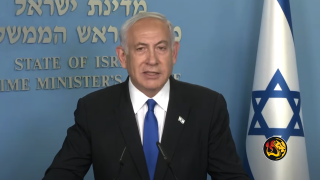
by Emmitt Barry, Worthy News Correspondent
(Worthy News) – Israeli Prime Minister Benjamin Netanyahu confirmed to the Knesset that Israel’s October “Days of Repentance” operation destroyed part of Tehran’s nuclear program, despite U.S. calls to avoid such sites. He also stated that the operation weakened Iran’s defense and missile production capabilities and vowed to prevent Iran from acquiring nuclear weapons.
The Israeli attack code-named ‘Days of Repentance’ was part of Israel’s largest military operation to date, taking place the day after the Feast of Tabernacles concluded. It involved over 100 combat aircraft and spanned more than 1,200 miles (2,000 km), and targeted around 20 military installations in Iran.
“In this attack, there is a specific component in their nuclear program that was hit,” Netanyahu explained in a broad foreign policy speech before the Knesset, discussing the centrality of Iran and its pursuit of nuclear weapons in Israel’s multi-front war. While Netanyahu did not specify the component, he noted that despite the successful operation, Iran’s path to a nuclear weapon has not yet been blocked.
At the end of the day, Netanyahu told the Knesset that Israel’s true test would be its ability to thwart or destroy Iran’s nuclear program.
“If we don’t take care of [Iran’s] nuclear program, then all the other problems will return,” he said, warning that Iran’s proxies would rearm and attack Israel again. He emphasized that the only way to prevent further October 7-style attacks was to prevent a nuclear Iran.
Israel may wait until President-Elect Donald Trump takes office in January before addressing Iran’s nuclear program. Earlier this month, Netanyahu remarked that he and Trump “see eye-to-eye on the Iranian threat in all of its aspects.”
Earlier this week, Worthy News reported that a former Israeli official familiar with the details of the strike reported that it obliterated advanced equipment used to develop the plastic explosives that encase uranium in nuclear devices, which are essential for their detonation.
While the West often views Iran’s nuclear program through a secular lens, the spiritual aspect, which plays a central role in driving Iran’s nuclear ambitions, should not be overlooked. Iran is the only country where Twelver Shi’ism is the state religion.
Twelver Shīʿism, the largest branch of Shīʿa Islam, makes up about 85% of Shīʿas. “Twelver” signifies belief in twelve divinely appointed leaders, the Twelve Imams, with the last, Imam al-Mahdi, expected to return as the Mahdi. Twelvers see the Imams as Muhammad’s spiritual and political successors, guiding with justice and interpreting Islamic law and the Qur’an’s inner meanings. They are viewed as infallible (Ismah) and divinely chosen (nass).
The Twelvers believe that the Mahdi is expected to appear in times of extreme chaos, returning alongside Jesus as a messiah to bring peace and establish Islam globally.
Twelver beliefs, Iran’s nuclear ambitions, and threats toward Israel and the West have raised concerns. Critics suggest that Iran’s Supreme Leader might incite conflict to hasten the 12th Imam’s arrival. Former Iranian President Ahmadinejad has even called for the Imam’s return at the UN, asserting that the Islamic Revolution’s primary goal is to prepare for his reappearance.
Copyright 1999-2026 Worthy News. This article was originally published on Worthy News and was reproduced with permission.
Latest News from Worthy News
The Trump administration has ended federal funding for gender-transition surgeries and cross-sex hormone treatments for transgender inmates in federal prisons, a policy shift officials say will save taxpayers nearly $2 million.
A widespread power outage plunged large portions of Cuba into darkness Wednesday, leaving millions without electricity across the island’s western and central regions, including the capital city of Havana.
Hundreds of Christians, including family members, have protested the killing of a young Christian agricultural worker by one or more Muslims in Pakistan’s eastern Punjab province and the alleged reluctance by authorities to properly investigate the case.
Treasury Secretary Scott Bessent said Wednesday that President Donald Trump’s newly announced 15% global import tariff is expected to take effect sometime this week as the administration moves to rebuild its tariff framework after a recent Supreme Court ruling struck down part of the president’s trade agenda.
President Donald Trump met Wednesday with leaders of major technology companies at the White House as they formally backed a new initiative designed to prevent the rapid expansion of artificial intelligence data centers from driving up electricity prices for American consumers.
Iran’s state television network briefly lost control of one of its main channels on Wednesday after hackers interrupted programming and aired a message from Crown Prince Reza Pahlavi calling on the Iranian military to side with protesters against the Islamic Republic.
Stocks rebounded after a report that Iran made indirect contact with the United States to negotiate an end to the war in the Middle East, boosting hopes that the conflict could be short-lived.







